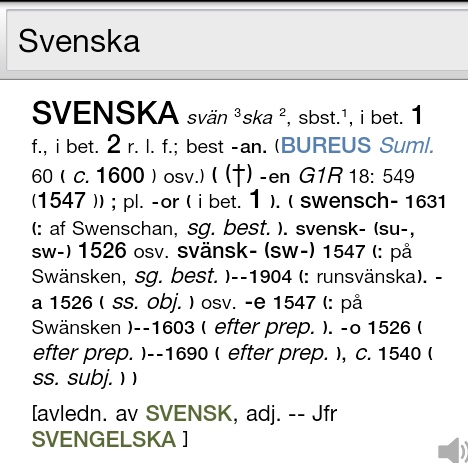From eye spasms to dumpster dive
The Swedish language expands in a variety of ways; new words are used and old words are used in new ways.
-
 A screenshot from Google's svensk ordbok app.
A screenshot from Google's svensk ordbok app. -
-
The Swedish language expands every year. Språkrådet, the Language Council of Sweden, puts together an annual list of new words that have entered Swedish. New words usually hint at events that have taken place during the year, but they can also be other words that are somehow current. Språkrådet collects words throughout the year by reading newspapers and by having people like you and me send in their suggestions.
"Anyone can send in suggestions," explained a spokesperson for Språkrådet a few years ago. "We are happy to hear from people who suggest new words."
Some words have short shelf lives, but others linger. The most telling new word of 2015? "Ögonkramp" — eye spasms, often caused by looking too closely and for too long at your cell phone screen. (According to an October 2015 story by Swedish News Agency TT, "The phenomenon of false myopia and eye spasms has increased sharply among young people, which means that they have trouble focusing their eyes at longer distances. The reason is that they spend too much time with their noses in the phone.") -
 All thirteen editions of Svenska Akademiens ordlista (The Swedish Academy's dictionary). New dictionaries are released every 10 years.
All thirteen editions of Svenska Akademiens ordlista (The Swedish Academy's dictionary). New dictionaries are released every 10 years. -
-
Some of the other new words from 2015 are:
Avinvestera — disposing of a previous investment, often for ethical or political reasons. Divesting. -
Cosplay — in use in English as well. The word was first formed in Japanese in the form kosupure from the English words costume play. Swedish has borrowed the English contraction cosplay. A form of masquerade in which participants dress up as fictional characters from TV, movies, comic books, computer games, etc., often figures in Japanese culture, but also from other cultures.
-
Delningsekonomi — activities are organized so as to use goods and services more efficiently by several people sharing them, such as carpooling or networking to swap homes for short periods. An accelerating digitization has changed the labor market fundamentally, permanent employment has given way to a fast-paced sharing economy, fewer people own a car; cars are shared and borrowed.
-
Douche — from English, a rude or unsympathetic person.
-
Dumpstra — Finding and using things that others tossed, in particular food. From the English "dumpster dive" ("sopcontainerdyk").
EU-migrant — EU citizens temporarily residing in another EU country to improve their material and social situation. More recently, EU migrants is often used synonymously with poor Roma who come to Sweden from Romania or Bulgaria (also called vulnerable EU citizens). -
Faktaresistens — you do not let yourself be influenced by facts that speak against your own opinion, which is instead based on, for example, conspiracy theories.
-
Funkis — no longer just everyday language for Bauhaus and the postmodern design of the 1930s and onward. Today's use of the word has to do with (people with) disabilities (Funktionsnedsättning=Disability).
-
Geoblockering — Technical barrier that prevents Internet content from appearing in a specific geographic area.
-
Groupie — originally a young person, especially a teenage girl, who is an ardent admirer of rock musicians or fan of a celebrity or of a particular activity; e.g., a tennis groupie. Today in Sweden a group picture where the photographer is in the picture (selfie-groupie).
-
Haffa — casual word among youth for picking up someone. Originally used to express catching someone a bit hard to get (which may or may not be true about picking someone up in a bar): "The police caught a criminal" — Polisen haffade en brottsling.
-
-
